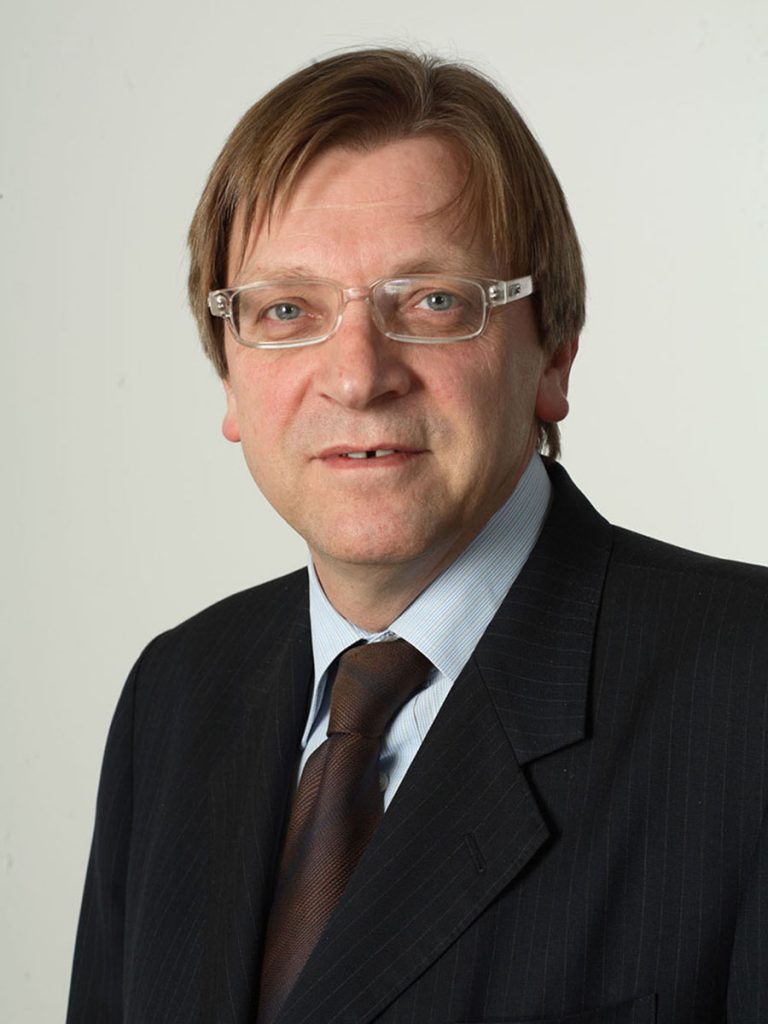Guy Verhofstadt, former Prime Minister of Belgium
Dear friends, let’s be straightforward from the outset. The recent election of the hardliner Ebrahim Raisi is bad news for Iran, for human rights, for the rule of law, and also, I think for the security of the region. The way these elections were organized showed again that Iran will never become a democracy under the current regime. In the Western press, we talk a lot about hardliners and moderates. But I think as long as Khamenei holds the ultimate power, this remains, in fact, a false distinction. Rouhani is a so-called moderate but he was responsible for over 4,000 executions, even more than under the presidency of hardliner Ahmadinejad. And the fact that Ahmadinejad was not allowed to run as a candidate must make us fear for the worst. Of the nearly 600 candidates who registered to run, seven were disqualified by the garden council led by Supreme Leader Ali Khamenei. He handpicked the candidate himself and made it clear to all the candidates that it would be a challenge to his altered conservative views. So, these elections were false. And on top of this all, we cannot be sure that the official results have not been tampered with. For Iranian society, this election is in fact a disaster. And if you take a closer look at his views on social issues from resco to the use of the internet, I think you quickly understand that all hopes about reforms are gone again. But today, I also want to talk to you about the impact the election of Raisi will have for Iran’s relationship with the West. Many claim that Raisi’s stance on the deal will not be very different from Rouhani. They argue that nuclear policy is decided by Khamenei, and that may be so, but the deal will only be possible and can only survive if the new Iranian leadership will allow the International Atomic Energy Agency to do his job. And I highly doubt that Raisi will be supportive of nuclear inspections. Secondly, Obama has put a lot of effort into establishing the nuclear deal because he believed it will help to open Iran to the rest of the world. However, Raisi should not expect Iran to open up to the West. The man in fact hates our democratic values. Let us not forget that he is under US sanctions over the past that includes the extrajudicial killing of thousands of political prisoners. And it will, I think, be very difficult for Biden to defend a deal with a man who is regarded as a mass murderer. And thirdly, we will probably see Iran that will intensify its attempts to control developments in neighboring states. Iran’s missile program and a more powerful Islamic Revolutionary Guard scopes will be dangerous for the security of the regions and the recent warnings of Rafael Grossi, the director general of the UN’s International Atomic Energy Agency, that Iran is not cooperating and that it is no longer possible to say with confidence whether Iran is seeking to build or not a bomb will complicate things even further. I expect that, especially in the US, resistance to the deal will increase and Biden will get a hard time to convince the American public and Congress that the deal will be in the interest of the United States, especially in Europe, there is as you know still, a strong drive to try to revive the 2015 nuclear deal as soon as possible. And I also believe we shouldn’t strive to revive the deal, but not at any cost. I think it will be a fatal mistake to only focus on the nuclear threat and regard the human rights violations as a secondary issue. We must never close our eyes to the sham elections, the terrorist attempts of the Iranian regime even on European soil and the human rights violations that occur in Iran every single day. We must pursue a dual strategy in which we put human rights higher on the agenda while trying to establish a safer environment in the Middle East. And let us be wary of the attempts, attempts of China, Russia and Turkey to increase their influence in the Persian Gulf. These countries do not care about the ordinary Iranian people or human rights, they just want to increase their influence in the region. I think the EU is still seen as a harmless broker and mistakes its responsibility. So, I urge the High Commissioner for Foreign Policy, Mr. Birrell, to step up and develop a comprehensive plan to defend basic human rights in Iran and organize collective security in the Persian Gulf. And in this plan, we must put more emphasis on human rights than we have done so far. I think that this strategy must contain three components. First, we must revive the nuclear deal but with the necessary safeguards of the UN’s International Atomic Energy Agency. Second, we must stop closing our eyes to the human rights violations instead of a blanket sanctions regime that punishes a whole society for the crimes of its leaders. We need to directly target the leaders who are responsible by using, for example, a new instrument or European Magnitsky act. And third, we must put an end to Iran’s missile program, which has become an increasing threat to the peace in the region. We need Iran to stop its long range rocket launches and the transfer of missiles to our regional proxies. Only if these three conditions are met, the West should ease Iran’s economic pain and propose new opportunities for economic growth, such as access to dollars and euros and more civilian nuclear cooperation.
As I said, the election of Raisi will make Iran the region in the world, a more unsafe and illiberal place I think. However, we should never give up. Let’s never give up on the great ordinary people of Iran who desperately need help. Thank you.

